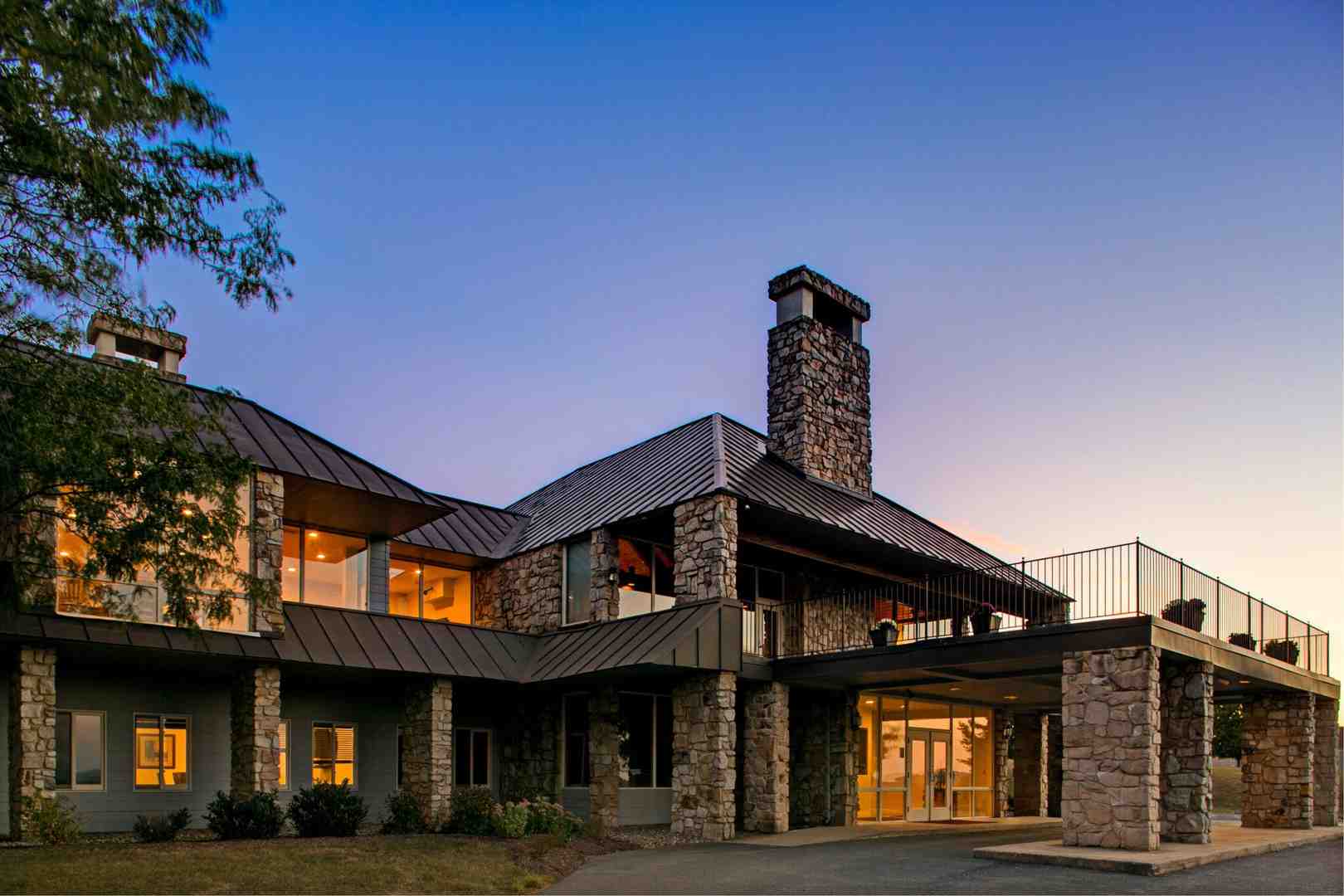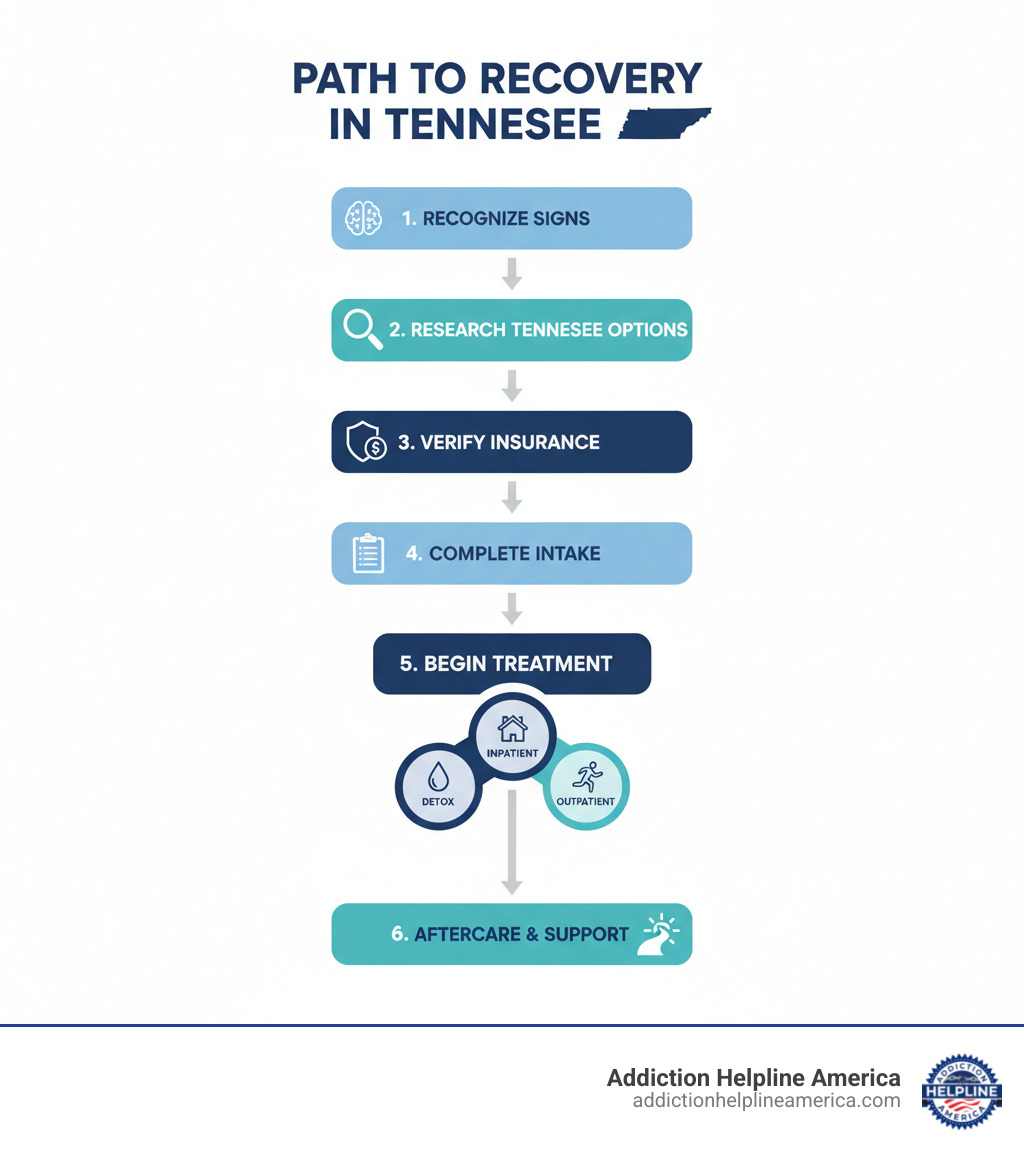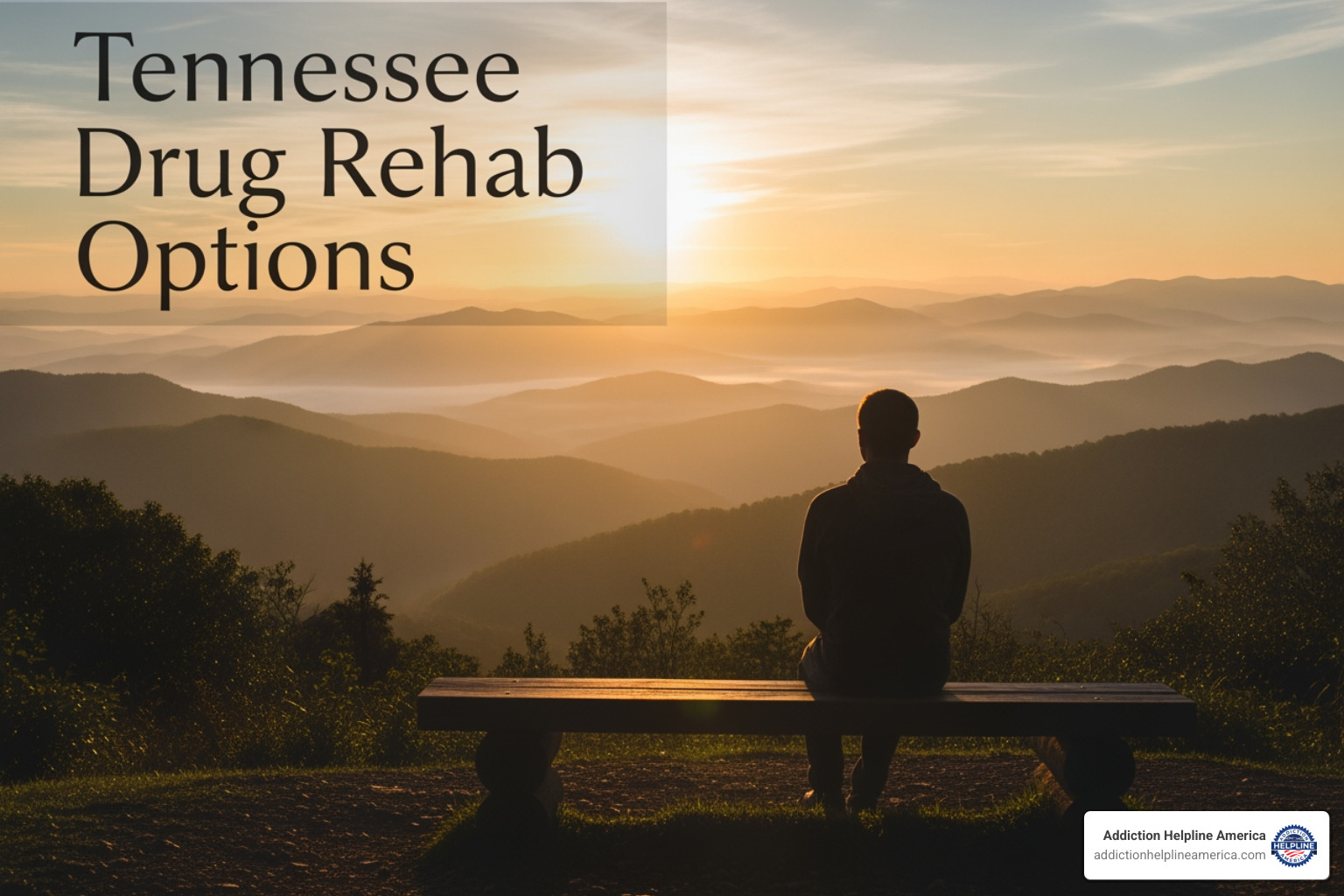
Finding Hope and Healing: Your Guide to Drug Rehab in Tennessee
Where can i find drug rehab in tennessee is a question that reflects both urgency and hope. If you or a loved one is struggling with addiction, here’s what you need to know right now:
Quick Answer: Finding Drug Rehab in Tennessee
- Call our 24/7 helpline for immediate, confidential support and guidance.
- Use our online resources to explore accredited Tennessee facilities.
- Contact your insurance provider to verify coverage and get in-network facility recommendations.
- Ask about state-funded options when you call, as many facilities offer them.
- Explore facilities in major cities including Nashville, Memphis, Knoxville, and Chattanooga.
Tennessee is facing a serious substance abuse crisis, with at least three residents dying from opioid-related overdoses every day. But here’s the important part: help is available, and recovery is possible.
The state offers more than 300 accredited treatment centers, from medical detox to long-term residential care. Whether you need inpatient treatment, outpatient services, or specialized programs, Tennessee’s recovery landscape provides diverse options to match your unique situation.
The cost varies—from approximately $57 per day for outpatient care to over $600 per day for inpatient services. Many facilities accept insurance (including TennCare and Medicare), offer sliding scale fees, or provide payment plans to make treatment accessible.
At Addiction Helpline America, we guide individuals and families through the process of finding appropriate drug rehab in Tennessee, connecting them with quality treatment centers that match their specific needs. Our mission is to provide the compassionate, confidential support you need to take that crucial first step toward recovery.
Key terms for where can i find drug rehab in tennessee:
Understanding the Types of Drug Rehab Programs in Tennessee
When searching for where can i find drug rehab in tennessee, it’s important to know what kind of help is out there. Addiction treatment isn’t one-size-fits-all. Tennessee offers a continuum of care—different levels of treatment that serve as stepping stones on your recovery journey. The American Society of Addiction Medicine (ASAM) provides criteria to help match people to the right level of care, ensuring your treatment plan is customized to your needs.
Let’s walk through the main types of programs available across Tennessee.
Medical Detoxification: The First Step
For many, recovery starts with detox. This isn’t just stopping substance use—it’s doing so safely under medical supervision. Withdrawal can be uncomfortable and, depending on the substance, dangerous. Symptoms can range from nausea and anxiety to severe complications like seizures.
Medically supervised withdrawal in a Tennessee detox center provides 24/7 medical monitoring. Trained staff can administer medications to ease symptoms, reduce cravings, and keep you safe. Detox prepares you mentally and physically for the therapy that follows, allowing you to focus on the underlying reasons for your addiction. You can find appropriate options through Addiction Helpline America Tennessee Detox Centers.
Inpatient and Residential Treatment
After detox, many people transition to inpatient or residential treatment. This involves living at the facility full-time, typically for 30, 60, or 90 days. Inpatient care removes you from your daily environment and triggers, placing you in a structured, supportive setting where recovery is the sole focus.
Days are filled with individual and group therapy, educational workshops, and holistic activities like yoga or art therapy. The peer support from others on a similar journey is a powerful component, often leading to lifelong recovery connections. Tennessee has residential programs throughout the state, and we can help you explore Addiction Helpline America Inpatient Programs in Tennessee.
Outpatient Programs: Flexible Care Options
Outpatient programs allow you to live at home while receiving professional treatment. This option is ideal for those stepping down from inpatient care or for individuals with less severe addictions and a stable home environment.
Tennessee offers several levels of outpatient care:
- Partial Hospitalization Programs (PHP): The most intensive, involving treatment for several hours a day, five to seven days a week.
- Intensive Outpatient Programs (IOP): A step down, typically involving nine to twelve hours of therapy spread across three to five days per week.
- Standard Outpatient Programs: The least intensive, usually with one or two therapy sessions per week for long-term maintenance.
Outpatient care helps you balance recovery with real-world responsibilities, applying new coping skills in your daily life. Check out Addiction Helpline America Outpatient Programs in Tennessee to see what’s available near you.
How to Choose the Right Treatment Center for You
When you’re asking “where can i find drug rehab in tennessee,” you’re really asking: Where can I find the right place for me? Finding the right match between a person and a program can make all the difference in recovery.
Key Factors to Consider When Searching for Drug Rehab in Tennessee
Sorting through Tennessee’s many treatment options can be challenging. Here’s what to focus on:
- Accreditation and Licensing: Ensure the facility is accredited by the Commission on Accreditation of Rehabilitation Facilities (CARF) or The Joint Commission. Also, verify it holds proper licensing from Tennessee’s Department of Mental Health and Substance Abuse Services. These credentials guarantee the facility meets high standards of care.
- Treatment Modalities: Look for evidence-based therapies like Cognitive Behavioral Therapy (CBT) and Dialectical Behavior Therapy (DBT). Ask if they offer holistic approaches (yoga, art therapy) or Medication-Assisted Treatment (MAT) for opioid or alcohol addiction.
- Staff Credentials: The clinical team should include licensed therapists, certified addiction counselors, and medical doctors with specialized training in addiction.
- Location: Decide if staying close to home for family support or seeking distance from triggers is better for you. Tennessee offers both urban and secluded rural settings.
- Aftercare Planning: Quality centers provide detailed aftercare plans, alumni programs, and relapse prevention strategies to support long-term sobriety.
Specialized Programs for Unique Needs
Cookie-cutter programs don’t work for everyone. Look for specialized care that fits your situation:
- Dual Diagnosis Treatment: For those with co-occurring mental health conditions like depression, anxiety, or PTSD, integrated treatment that addresses both addiction and mental illness is crucial.
- Veterans Programs: These programs address the unique challenges veterans face, such as combat trauma and PTSD. TRICARE may cover treatment costs, and we can connect you with Addiction Helpline America Specialized Programs in Tennessee designed for veterans.
- Gender-Specific Care: Men’s and women’s programs create safe spaces to address sensitive issues. Women’s programs often focus on trauma and relationships, while men’s programs may emphasize healthy emotional expression.
- LGBTQ+ Affirming Programs: These provide an inclusive environment, addressing specific challenges like minority stress and discrimination.
- Adolescent Programs: These use age-appropriate approaches for teenagers, whose developmental and social needs differ from adults.
- Criminal Justice Programs: Tennessee offers special programs for individuals involved with the criminal justice system, recognizing that treatment can break the cycle of substance abuse and crime.
Examples of Rehab Centers Across Tennessee
Quality care is accessible across Tennessee, from major cities to smaller communities.
In West Tennessee, Addiction Helpline America Memphis TN can connect you with local options. Middle Tennessee has a wide variety of centers; explore Addiction Helpline America Nashville TN to see the range. East Tennessee offers options in Addiction Helpline America Knoxville TN and Addiction Helpline America Chattanooga TN.
Smaller cities also host excellent facilities. Our network includes unique programs like Church of Salvation New Canaan Ranch Pulaski TN and community-based centers like Camelot Care Centers Cleveland TN and Centerstone Lawrenceburg TN. In Nashville, you’ll find diverse options from Mending Hearts Nashville TN to Addiction Campuses Nashville TN. We also work with facilities in Dandridge, Wartburg, Huntingdon, and McMinnville.
The variety means there’s a program right for you, and we are here to help you find it.
Navigating the Cost of Rehab and Payment Options in Tennessee
When you’re searching for where can i find drug rehab in tennessee, the cost can be a major concern. However, financial worries should never be a barrier to recovery. There are many payment options available to make treatment affordable.
Understanding the Average Costs
The price of rehab in Tennessee varies based on the program type, duration, and services. The average cost for substance abuse treatment in Tennessee is approximately $56,600, but this covers a wide spectrum of care.
More specifically:
- Inpatient rehab costs about $628.89 per day without insurance.
- Outpatient programs are more affordable at around $56.60 per day.
These are sticker prices. Your actual out-of-pocket cost is often much lower, depending on your insurance and other financial aid. Factors like location, amenities, and level of medical care all influence the price, but the most important thing is finding a program that fits your clinical needs, not just one with a high price tag.
How to Pay for Drug Rehab in Tennessee
Tennessee has a comprehensive system to help people access treatment regardless of their financial situation. Your options include:
- Private Health Insurance: Most employer-sponsored and marketplace plans cover a significant portion of addiction treatment.
- TennCare (Tennessee’s Medicaid): Provides comprehensive coverage for substance abuse treatment for residents with limited income.
- Medicare: Covers various addiction treatment services for those 65 or older or with certain disabilities.
- State-Funded Assistance: Tennessee’s Department of Mental Health and Substance Abuse Services offers grants to help cover treatment for eligible individuals.
- Sliding Scale Fees: Many facilities adjust the cost of treatment based on your income and ability to pay.
- Private Pay: Self-pay options are always available, and some facilities offer flexible payment plans.
- Indian Health Services (IHS): Native Americans may access treatment through the IHS Alcohol and Substance Abuse Program.
When you’re asking where can i find drug rehab in tennessee that you can afford, the answer is that quality facilities are within reach. We can help you steer these payment options.
Verifying Your Insurance Coverage
Understanding your insurance benefits is key to reducing costs. This process is simpler than you might think.
An easy option is to contact a rehab admissions team, like our helpline at Addiction Helpline America. We offer complimentary insurance verification. Provide your insurance information, and we’ll contact your provider, determine your coverage, and give you a realistic estimate of your costs.
Federal law is on your side. The Mental Health Parity and Addiction Equity Act (MHPAEA) requires most insurance companies to provide the same level of benefits for substance use treatment as they do for medical care. Additionally, the Affordable Care Act (ACA) mandates that all marketplace plans must cover substance use disorder services.
These protections empower you to advocate for yourself and ensure you receive the benefits you’re entitled to. The bottom line is that cost should not stop you from getting help. Let us help you figure out the financial piece so you can focus on recovery.
Where Can I Find Drug Rehab in Tennessee? A Step-by-Step Guide
If you’re asking where can i find drug rehab in tennessee, you’ve already taken the courageous first step. You don’t have to steer this journey alone. Let’s walk through the process together.
Recognizing the Signs: When to Seek Help
Knowing when it’s time to seek treatment can be the hardest part. Look for these common signs:
- Behavioral Changes: Secretiveness about substance use, engaging in risky behaviors, or losing interest in once-loved activities.
- Physical Symptoms: Poor hygiene, unexplained weight changes, changes in pupil size, or withdrawal symptoms like tremors and nausea when trying to stop.
- Relationship & Responsibility Issues: Frequent arguments with loved ones, strained connections, poor work performance, or neglecting responsibilities at home.
- Financial Strain: Unexplained money problems, borrowing or stealing, or spending excessive amounts on substances.
- Loss of Control: Unsuccessfully trying to cut down, needing more of the substance for the same effect (tolerance), or using more than intended.
If these signs resonate, please know that Tennessee has an extensive network of professionals ready to help.
The Admissions Process: What to Expect
Getting into treatment is more straightforward than you might think. The process generally includes:
- Initial Confidential Call: This is a judgment-free call to a helpline like ours or a treatment facility. You can share your story, ask questions, and learn about your options.
- Clinical Assessment: A qualified professional will conduct an assessment to understand your substance use history, health, and personal circumstances. This helps create a personalized treatment plan.
- Insurance Verification: The admissions team will contact your insurance provider to determine your coverage and out-of-pocket costs, taking this burden off your shoulders.
- Travel and Logistics: Once you choose a program, the team will help coordinate travel and provide a list of what to pack. Most facilities have restrictions on items like electronics to maintain a therapeutic environment.
Our team at Addiction Helpline America is here to guide you through each step, ensuring a smooth transition into treatment.
State and National Resources for Finding Help
Tennessee has a strong support system for individuals and families affected by addiction. Knowing where to turn can make all the difference.
The Tennessee Department of Mental Health and Substance Abuse Services website offers information on state-supported initiatives and resources. Our helpline can also connect you with state-funded programs and services across Tennessee.
Addiction impacts the entire family. Family support groups like Al-Anon and Nar-Anon provide a crucial, safe space for family members to share experiences and learn how to support their loved one while also caring for themselves.
At Addiction Helpline America, we are dedicated to connecting you with the best available treatment options. Our vast network includes diverse programs across the state. Our compassionate navigators provide free, confidential guidance to help you find the right fit. Visit our Tennessee resources page to explore your options, or call us anytime.
Frequently Asked Questions about Tennessee Drug Rehab
When you’re searching for where can i find drug rehab in tennessee, many questions arise. Here are answers to some of the most common concerns we hear.
How long does rehab in Tennessee typically last?
The length of stay is customized to your unique needs. Common program durations include:
- 30-day programs: Provide an intensive introduction to recovery, often sufficient for detox and initial therapy.
- 60-day programs: Allow for deeper therapeutic work and more time to build and practice new coping skills.
- 90-day programs: Often considered the gold standard, as research shows longer treatment correlates with better long-term outcomes.
- Long-term options: Programs extending six months to a year may be recommended for those with chronic relapse histories or complex needs.
Rehab is just the beginning. Effective aftercare planning, including ongoing therapy and support groups, is crucial for lasting recovery. Your initial assessment will help determine the right length of stay for you.
Can I lose my job for going to rehab?
In most cases, no, you cannot lose your job for going to rehab. Federal laws offer significant protection:
- The Americans with Disabilities Act (ADA) protects individuals with a history of substance use disorder from workplace discrimination.
- The Family and Medical Leave Act (FMLA) allows eligible employees to take up to 12 weeks of unpaid, job-protected leave for serious health conditions, including addiction treatment.
Strict confidentiality laws also protect your privacy. While it’s wise to understand your company’s specific policies, legal protections exist to support your decision to seek treatment. Don’t let job fears prevent you from getting the help you deserve.
How can I help a loved one who doesn’t want to go to rehab?
It’s heartbreaking to watch a loved one refuse help. While you can’t force them, you can take steps that may encourage them to seek treatment:
- Express Concern Lovingly: Use “I” statements to share how their substance use affects you, without judgment or anger (e.g., “I feel scared when…”).
- Set Healthy Boundaries: This is crucial. It might mean refusing to give them money, not covering for them, or not allowing substance use in your home. Boundaries protect you and create natural consequences.
- Avoid Enabling: Enabling behaviors, like paying their bills or making excuses for them, remove the consequences of their addiction and make it easier for them to continue using.
- Seek Family Support: Consider family therapy or support groups like Al-Anon and Nar-Anon. These resources help you learn to cope and support your loved one effectively.
- Consider a Professional Intervention: A trained interventionist can guide your family in a structured, compassionate conversation designed to help your loved one accept the need for treatment.
Remember to take care of yourself. Seeking your own support isn’t selfish—it’s essential. At Addiction Helpline America, we support families navigating these challenges and can connect you with appropriate resources throughout Tennessee.
Conclusion: Your Path to Recovery in Tennessee Starts Today
If you’ve been searching for where can i find drug rehab in tennessee, know that you are already on the path to recovery. The act of seeking information is a sign of courage and hope.
Tennessee’s recovery landscape is diverse, offering everything from medical detox and residential programs to flexible outpatient care and specialized treatment. Recovery is possible, and it’s happening every day across the Volunteer State.
We know the journey can feel overwhelming, with questions about cost, work, and taking the first step. But you don’t have to do this alone. Insurance options like TennCare and Medicare, along with over 300 accredited facilities, make treatment accessible.
At Addiction Helpline America, our mission is to ensure everyone has access to quality addiction treatment. We offer free, confidential, personalized guidance to help you find the right program from our extensive network. We are here to listen and connect you with the care that fits your specific needs.
Your story doesn’t have to be a statistic. Your path can lead to recovery, reconnection, and a life you’re proud to live. The best time to seek help was yesterday. The second best time is right now.
Find a Tennessee rehab center now
We’re here, we’re ready, and we believe in you.
Our helpline is 100%
free & confidential
If you or someone you care about is struggling with drug or alcohol addiction, we can help you explore your recovery options. Don’t face this challenge alone—seek support from us.
Programs
Resources
Will my insurance
cover addiction
treatment?
We're ready to help
Find the best
drug or alcohol treatment
center
Are you or a loved one struggling with addiction? Call today to speak to a treatment expert.
















